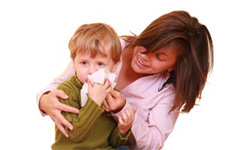Infant Colds

A Guide to Caring for Infant Colds
One of the hardest things for many parents to deal with when they have infants and newborns is infant colds. Everyone is susceptible to colds, even babies. But colds are hard on infants because they have very small nasal passages and become easily congested, and because there are very few medications you can use with children under the age of six that can help relieve the symptoms of a cold.
You should make sure that you are prepared for infant colds. You need to know what the signs and symptoms are for infant colds so that if the symptoms differ you can get your infant to a doctor for treatment. A runny nose and/or congestion is usually the first sign of an infant cold. Babies do indeed have very tiny nasal passages which are easily clogged. At first the discharge may be clear but it will progress to green or yellow. Babies also usually have some sneezing, coughing, watering eyes, and even a low-grade fever.
If your infant is healthy, he or she will have an immune system that is plenty strong enough to fight off infant colds. Because colds are viruses, they cannot be treated with antibiotics. If you have a newborn, less than three months old, you should call your doctor for advice and to see if you should make an appointment for an office visit. With a newborn you don’t want to take any chances plus you can learn exactly what to do to treat the cold. If this is your first child, such instructions can be very useful.
Because infants cannot blow their noses, you will most likely have to suction the mucous out with a rubber-bulb syringe. The first thing you do is eliminate all of the air from the syringe by squeezing the bulb. Keep the bulb in this squeezed-in position. Place the syringe into the child’s nostril by about a quarter of an inch and point it to the back of the nose. Release the bulb and it will suction the mucous into the syringe.
Release the mucous into a tissue and then suction out the other side of the nose. Clean the syringe with soap and water. Do this as often as you need to in order to keep the infant’s nasal passages as clear as possible. A saltwater spray can help to make mucous runnier and your doctor might recommend you use one.
Make sure that your infant is drinking plenty of fluids as this will help the cold leave the child more quickly. If you are breastfeeding, you might even try to get the baby to drink more times than normal. Sometimes a humidifier can help relieve mucous flow and the nasal passage discomfort.
Infant colds can often be accompanied by a mild fever so make sure you are prepared with an infant or child thermometer and that you continually check to see if there is a fever, and if so, how highit is. If your child is over three months old and seems particularly uncomfortable or in pain, you can give the infant ibuprofen or acetaminophen to help reduce pain. Ask your doctor for the correct dosage. You should not give a child cough or cold medicines. You should also not give a child aspirin. If it turns out to be the flu, the aspirin could cause Reye’s syndrome, a possibly fatal disease.
Babies are so helpless that it is particularly distressing should one catch a cold. Plus, it is most likely going to make the baby cranky and no one is going to get any sleep until the cold dissipates.
If any of the following symptoms develop, the illness may be more than a common cold and you need to get the child to the doctor: a temperature of more than 100 degrees lasting 3 days, more than one week of coughing, a green nasal discharge that thickens and lasts two weeks, eye discharge (especially yellow), ear pain, sinus pain, or wetting diapers much more frequently than normal. If the child stops taking in fluids or has violent coughing or vomiting, get to a doctor or hospital emergency room right away.